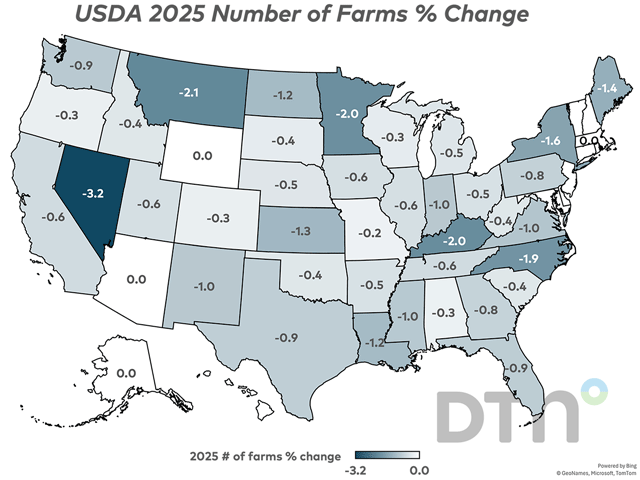Court Vacates Dicamba Registrations
Dicamba Availability in Question After Court Vacates EPA Registrations
This article was originally posted at 5:24 p.m. CST on Tuesday, Feb. 6. It was last updated with additional information at 7:04 a.m. CST on Wednesday, Feb. 7.
**
LINCOLN, Neb. (DTN) -- A federal court in Arizona on Tuesday vacated the 2020 registrations of three dicamba products previously approved by the EPA for over-the-top applications including XtendiMax, Engenia and Tavium. The court ruled the agency violated notice-and-comment mandates for new-use pesticide registrations.
The ruling in the U.S. District Court for the District of Arizona in Tucson effectively leaves farmers without dicamba products for the upcoming growing season pending action by the EPA.
"The court accepts that there are substantial benefits from OTT (over-the-top) dicamba for DT (dicamba-tolerant) crops (cotton and soybean) for weed control, especially for controlling weeds that are resistant to other herbicides or when there is no herbicide resistance, OTT dicamba affords flexibility in herbicide choices for rotating or mixing herbicides to manage weed resistance," the court said in its ruling.
"Defendants ignore that likewise the Ninth Circuit in NFFC (Monsanto) previously explicitly considered such effects and decided to vacate these OTT dicamba registrations. 'Being aware of the practical effects' of vacatur and 'difficulties these growers may have in finding effective and legal herbicides to protect their DT crops due to vacatur,' the court nevertheless found the seriousness of the agency error, including in part its failure to assess risks and costs for non-users of OTT dicamba compelled vacatur."
The court found the EPA's "circular approach to assessing risk, hinging on its high confidence that control measures will all but eliminate offsite movement, (led) to its corresponding failure to assess costs from offsite movement."
The restrictions implemented by the EPA failed, and dicamba continued to vaporize and drift, the court said.
The federal court found the EPA to be in violation of the Federal Insecticide, Fungicide, and Rodenticide Act, or FIFRA.
DTN reached out to the registrants Bayer, BASF and Syngenta for comment on the ruling.
Bayer, the registrant for XtendiMax, offered the following statement: "The U.S. District Court in Arizona vacated the EPA's registrations for over-the-top dicamba products based on procedural grounds, finding that the EPA 'did not follow the FIFRA notice and comment provisions' when it issued the registrations. We respectfully disagree with the ruling against the EPA's registration decision and we are assessing our next steps. We also await direction from the EPA on important actions it may take in response to the ruling. Our top priority is making sure growers have the approved products and support they need to safely and successfully grow their crops. We will keep our customers updated as we learn more from the EPA in advance of the 2024 growing season."
BASF, the registrant for Engenia, said in a statement on Tuesday evening that it was assessing the court's ruling to determine the next steps.
P[L1] D[0x0] M[300x250] OOP[F] ADUNIT[] T[]
"Most soybean and cotton farmers have made seed and chemistry purchase decisions and in some cases, are preparing to plant their 2024 crop in the coming weeks. As a result, this order may threaten the livelihoods of soybean and cotton farmers who rely on over-the-top dicamba to control resistant weeds," BASF said.
"Agricultural input supply chains, which are still recovering from 2020 disruptions, are complex and will be significantly affected by the unanticipated chemistry demands on more than 40 million dicamba-tolerant soybean and cotton acres directly impacted by this order."
Syngenta said it was exploring the next steps and waiting for guidance from the EPA. Syngenta is the registrant for Tavium.
"We are disappointed in the court's decision to vacate the 2020 over the top dicamba registrations," the company said in a statement to DTN.
"We are reviewing our legal options and await the EPA's guidance in connection with the court's decision. The use of dicamba is integral to controlling broadleaf weeds and invasive plants. It is imperative that farmers have access to newer dicamba technologies as they work to protect their livelihoods, supply food, and meet ever-increasing weed control challenges in an environmentally safe and sound way."
Kulm, North Dakota, farmer Josh Gackle, president of the American Soybean Association, said in a statement the ruling has put farmers in a bind.
"We are incredibly disappointed in the Arizona district court's ruling on the dicamba registration, which greatly risks disrupting supply chains and harming the entire farm economy," he said.
"Especially coming at a time when most growers have already purchased seeds and herbicides for the growing season this ruling stands to inflict great financial harm and uncertainty on many farmers preparing for spring planting. We will continue to review the decision and consider what options for recourse exist for U.S. farmers in the days ahead."
George Kimbrell, the Center for Food Safety's legal director and counsel in the case, called the ruling "a vital victory for farmers and the environment."
"Time and time again, the evidence has shown that dicamba cannot be used without causing massive and unprecedented harm to farms as well as endangering plants and pollinators," Kimbrell said. "The court today resoundingly re-affirmed what we have always maintained: The EPA's and Monsanto's claims of dicamba's safety were irresponsible and unlawful."
The court also found EPA in violation of the Administrative Procedure Act.
"The EPA denied the public its statutory right to meaningfully weigh in during the decision-making process before EPA concludes whether OTT dicamba has unreasonable adverse effects on the environment," the court said.
"The court finds a violation of the APA because the EPA's agency approval of the new use, OTT dicamba, registrations without notice and hearing, was not in accordance with law and without observance of procedure required by law."
The cost of herbicide-resistant weeds to U.S. agriculture is estimated at more than $2 billion, according to court documents, with 52% potential loss in yield in soybean production from weeds and $392 million loss possible in one year from a decrease in cotton yields.
In December 2020, the Center for Biological Diversity, National Family Farm Coalition, Pesticide Action Network and the Center for Food Safety filed the lawsuit.
They've argued that several changes EPA made to the dicamba registrations of XtendiMax, Engenia and Tavium had not fixed problems highlighted in a ruling by the U.S. Court of Appeals for the Ninth Circuit in June 2020.
The Ninth Circuit vacated those registrations.
In February 2023, EPA posted label amendments to restrict further over-the-top dicamba use in Iowa, Illinois, Indiana and South Dakota.
The plaintiffs in the case had asked the court to remand the registrations back to EPA.
Read more on DTN:
"Dicamba Court Ruling Appears Imminent," https://www.dtnpf.com/…
"Groups Want Dicamba Registration Pulled," https://www.dtnpf.com/…
Todd Neeley can be reached at todd.neeley@dtn.com
Follow him on X, formerly know as Twitter, @DTNeeley
(c) Copyright 2024 DTN, LLC. All rights reserved.






